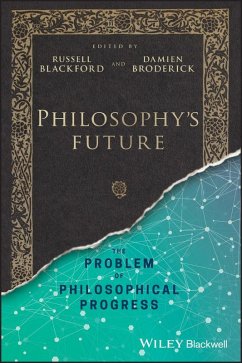
Also a History of Philosophy, Volume 1 (eBook, ePUB)
The Project of a Genealogy of Postmetaphysical Thinking
Übersetzer: Cronin, Ciaran
Versandkostenfrei!
Sofort per Download lieferbar
38,99 €
inkl. MwSt.
Weitere Ausgaben:

PAYBACK Punkte
0 °P sammeln!
This is the first volume of a ground-breaking new work by Jürgen Habermas on the history of philosophy. In this major new work, Habermas sets out the ideas that inform his systematic account of the history of Western philosophy as a genealogy of postmetaphysical thinking. His account goes far beyond a vindication of the enduring relevance of philosophical reflection founded on communicative reason as a source of orientation in the modern world. He contrasts this conception with prominent diagnoses of the supposed crisis of Enlightenment reason and culture that seeks redemption in the affirmat...
This is the first volume of a ground-breaking new work by Jürgen Habermas on the history of philosophy. In this major new work, Habermas sets out the ideas that inform his systematic account of the history of Western philosophy as a genealogy of postmetaphysical thinking. His account goes far beyond a vindication of the enduring relevance of philosophical reflection founded on communicative reason as a source of orientation in the modern world. He contrasts this conception with prominent diagnoses of the supposed crisis of Enlightenment reason and culture that seeks redemption in the affirmation of traditional religious authority (Schmitt), the timeless validity of Greek metaphysics (Strauss), a numinous conception of nature (Löwith), and an occurrence of being that speaks to us from beyond the mists of pre-Socratic thought (Heidegger). Habermas situates Western philosophy in relation to traditions of thought founded in the major worldviews (Judaism, Buddhism, Confucianism and Taoism) that continue to shape contemporary culture and civilization. At the same time, he lays the groundwork for his analysis in the later volumes of the constitutive role played by the discourse on faith and knowledge in the development of Western philosophy, which is the result of the unique symbiosis that Christianity entered into with Greek thought with the Christianization of the Roman Empire. Far from raising claims to exclusivity, completeness or closure, Habermas's history of philosophy, published in English in three volumes, opens up new lines of research and reflection that will influence the humanities and social sciences for decades to come.
Dieser Download kann aus rechtlichen Gründen nur mit Rechnungsadresse in D ausgeliefert werden.













